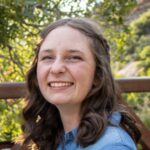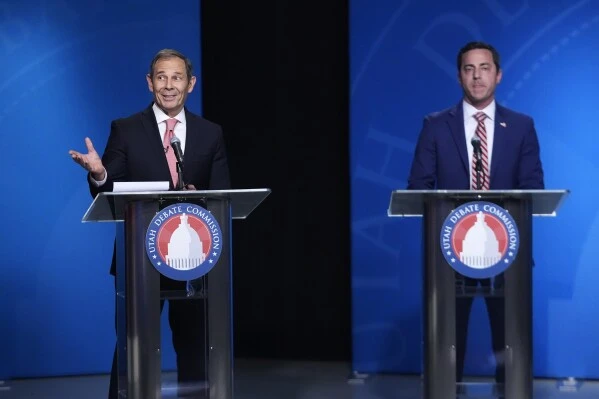June 10-12, 2024, the Utah Debate Commission sponsored six Republican Primary debates for the currently contested positions of governor; attorney general; senator; and first, second and third congressional districts.
Piute, Wayne and Garfield counties are in the Second Congressional District, so all relevant debates are covered in this article.
Topics centered around living costs, immigration, government spending, water, federal overreach, abortion, and diverging conservative values.
Governor Debate
The Republican candidates for Utah governor are Spencer Cox and Phil Lyman.
Governor Spencer Cox is running for a second term. At the debate, he took a position of pride in “what we can accomplish when we work together,” listing out what he considers the state’s accomplishments over the last four years.
State Representative Phil Lyman from Blanding took a less positive stance. He committed to “tell [people] the truth and the harsh reality” of what was happening and what was needed in Utah.
The two candidates largely agreed on most issues of abortion, energy, water and Utah Fits All scholarships. But there were some things they disagreed on with the role of state government.
“Legislation is coming from the top down. It’s not supposed to happen that way. It’s supposed to come from the bottom up,” said Representative Lyman. He said education legislation needed to involve parents more, and housing should be controlled by the free market.
Governor Cox felt the state government was doing exactly what it should do. “People don’t pay enough attention to what the state legislature is doing,” said Governor Cox, adding that it was very involved in local issues. He considered housing and homelessness statewide issues and put the state government central in solving those problems.
Governor Cox also did not believe in aggressive rhetoric. It was important, he said, to check his conduct because that would reflect on his state. This has been his position as governor and throughout his campaign.
Representative Lyman disagreed with his opponent’s position. He believed that Utah governors in the past who asserted their positions against the federal government, for example, had gotten the government to back down.
Attorney General Debate
The Republican candidates for Utah attorney general are Derek Brown, Frank Mylar and Rachel Terry.
Derek Brown emphasized in his position that he is working for the people. “I am your attorney,” he said, citing his experience as an elected official in the Utah House of Representatives as well as his law practice.
Frank Mylar built his platform around age and experience. He has worked in law for over 36 years, he said, with 12 in the attorney general’s office.
Rachel Terry has extensive experience in education law and has also worked for the attorney general. She loves the work, she said, and she is excited for the job.
Debate was heavy around public trust and whether or not the candidates would bring conflict of interest.
Both Terry and Mylar highlighted the fact that they have no conflicts. “What’s priceless is nobody owns me going into the office” said Mylar. He even suggested hiring a person in his office to look for conflicts of interest.
Terry was ruthless in attacking her opponent Derek Brown for lobbying with social media companies currently under investigation. “If you want to stay out of trouble, don’t go looking for it,” she said.
Brown said he does not currently work for those companies. But his work with social media groups in the past was a positive thing that allowed him expertise in social media law. “You don’t want an attorney general who doesn’t have that kind of background,” he said, because that kind of experience means they have been a good lawyer.
Candidates had similar goals when it came to fighting federal overreach, focusing on Title 9 and creating transparency. They all agreed with the Utah Fits All scholarships and the Supreme Court’s decision to leave abortion laws up to the states.
Senator Debate
The Republican candidates for U.S. Senator are John Curtis, Trent Staggs, Jason Walton and Brad Wilson.
Representative John Curtis comes from almost seven years in the U.S. House. His standpoint made him a man of the people: accessible and transparent. He relied on his big name as a representative, and as a businessman and mayor of Provo.
Mayor Trent Staggs from Riverton has the Republican party endorsement. He committed to “stand up to the establishment” in Washington, DC.
Jason Walton, a business owner, centered his position around his understanding of federalism, and his ability to build a business and follow a budget.
Brad Wilson, previously a member of the Utah House of Representatives and a small business owner, had a platform of “conservative values as a culture,” taking the “Utah way” to Washington.
The four candidates had very similar ideologies. Thus, debate centered around their experience, who they were voting for, and their interpretations of “conservative.” All four are voting for Donald Trump, with varying levels of support. All oppose tax increases, and most blame Joe Biden for immigration policy failures.
Where the candidates tried to differentiate themselves most was in their understanding of “conservative.”
For Representative John Curtis, a real conservative represents the “values of the people you serve.” His focus was on his constituents, in Utah.
Walton stood for the constitution, even a sacred defense of the constitution and federalism.
Wilson highlighted conservatism by pointing out things in the government today that do not reflect his values. Those were “open borders, out-of-control spending and a lack of discipline.”
Mayor Staggs had a mixed definition, specifically mentioning federalism and not adding to the national debt.
Both Wilson and Representative Curtis expressed their willingness to understand where people were coming from and listen to diverging conservative groups.
Second Congressional District Representative Debate
The Republican candidates for Second Congressional District U.S. Representative are Celeste Maloy and Colby Jenkins.
Representative Celeste Maloy is running for a second term after jumping into the seat just six months ago in November 2023. “I am second district through and through,” she said, citing her education at Southern Utah University and her work in Beaver and Washington counties.
Colby Jenkins is a former combat veteran dedicated to defense of the Constitution. “You’re not hiring me to surrender,” he said, a slogan he held to throughout the debate.
Jenkins was critical of Maloy’s voting, especially when it came to Congress’ budget.
Maloy said she has been able to get a lot more done by working with people all across the spectrum of political thought and getting along with people. “An individual can have a lot more influence than one vote,” she said. She said she was willing to compromise, not on principle but on policy, in order to get invited to the table.
Jenkins, though, said there was a difference between compromise and negotiation. “I will negotiate all day,” he said, “but I will not compromise on the constitution.” Jenkins accused Maloy of playing for the other team by voting for a policy with earmarks.
Jenkins was also very strong in his support for Donald Trump and questioned his opponent’s support for the Republican nominee. Maloy said she would vote for the Republican nominee, so she will vote for Trump.
Primary Election
Though water was a big issue referenced in the senator and representative debates, both groups deferred to the state as the ultimate authority on its own water.
The 2024 Republican Primary election will be on June 25.
– by Abbie Call
Feature image caption: Candidates John Curtis and Trent Staggs at Utah’s Republican Primary Debate for U.S. Senator on June 10, 2024. Courtesy of Rick Bowmer, AP.
Read two Garfield County delegates’ candidate recommendations in 2024 GOP Primary Recommendations.

Abbie Call – Cannonville/Kirksville, Missouri
Abbie Call is a journalist and editor at The Byway. She graduated in 2022 with a bachelor’s degree in editing and publishing from Brigham Young University. Her favorite topics to write about include anything local, Utah’s megadrought, and mental health and meaning in life. In her free time, she enjoys reading, hanging out with family, quilting and hiking.
Find Abbie on Threads @abbieb.call or contact her at abbiecall27@gmail.com.

